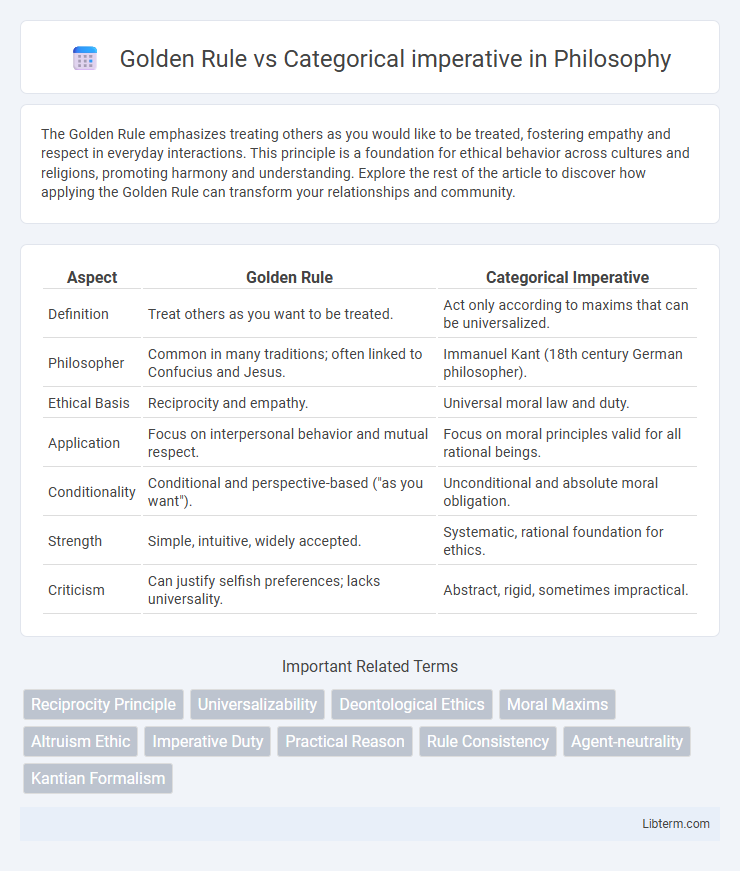The Golden Rule emphasizes treating others as you would like to be treated, fostering empathy and respect in everyday interactions. This principle is a foundation for ethical behavior across cultures and religions, promoting harmony and understanding. Explore the rest of the article to discover how applying the Golden Rule can transform your relationships and community.
Table of Comparison
| Aspect | Golden Rule | Categorical Imperative |
|---|---|---|
| Definition | Treat others as you want to be treated. | Act only according to maxims that can be universalized. |
| Philosopher | Common in many traditions; often linked to Confucius and Jesus. | Immanuel Kant (18th century German philosopher). |
| Ethical Basis | Reciprocity and empathy. | Universal moral law and duty. |
| Application | Focus on interpersonal behavior and mutual respect. | Focus on moral principles valid for all rational beings. |
| Conditionality | Conditional and perspective-based ("as you want"). | Unconditional and absolute moral obligation. |
| Strength | Simple, intuitive, widely accepted. | Systematic, rational foundation for ethics. |
| Criticism | Can justify selfish preferences; lacks universality. | Abstract, rigid, sometimes impractical. |
Understanding the Golden Rule: Origins and Meaning
The Golden Rule, rooted in ancient philosophies and religions such as Confucianism and Christianity, emphasizes treating others as one wishes to be treated, promoting empathy and reciprocity in human interactions. Its simplicity and universality have made it a fundamental ethical principle across cultures, highlighting moral reciprocity and personal responsibility. This contrasts with Kant's Categorical Imperative, which demands actions be universally applicable as a moral law, focusing on duty rather than relational reciprocity.
Defining the Categorical Imperative: Kant’s Ethical Framework
The Categorical Imperative, central to Kant's ethical framework, mandates actions based on universal principles that apply to all rational beings, emphasizing duty over consequence. Unlike the Golden Rule, which encourages treating others as one wishes to be treated, Kant's imperative requires acting only according to maxims that can be consistently willed as universal laws. This deontological approach grounds morality in rationality and autonomy, insisting that ethical decisions respect the intrinsic worth of individuals as ends in themselves.
Historical Context: Development of Moral Principles
The Golden Rule, rooted in ancient civilizations including Egyptian and Confucian teachings, emphasizes reciprocal ethics based on empathy and social harmony. Immanuel Kant developed the Categorical Imperative during the Enlightenment, grounding morality in universal, rational principles independent of personal desires. This shift marks a transition from empirical, tradition-based ethics to formalized, objective moral laws in Western philosophy.
Core Differences Between the Golden Rule and Categorical Imperative
The Golden Rule, often stated as "treat others as you want to be treated," is a principle rooted in empathy and reciprocity, emphasizing personal perspective in ethical behavior. The Categorical Imperative, formulated by Immanuel Kant, is a universal moral law that requires actions to be universally applicable and based on duty, independent of personal desires or consequences. Core differences lie in the Golden Rule's reliance on subjective feelings, while the Categorical Imperative demands objective, principle-based judgment applicable to all rational beings.
Practical Applications in Everyday Life
The Golden Rule, emphasizing reciprocity and empathy, guides daily interactions by encouraging individuals to treat others as they wish to be treated, fostering kindness and cooperation in personal and professional contexts. The Categorical Imperative, developed by Immanuel Kant, demands actions be universally applicable and respect the autonomy of all individuals, leading to ethical decision-making that upholds fairness and moral duty regardless of personal desires. Practical applications of these principles manifest in workplace ethics, conflict resolution, and social responsibilities, ensuring behaviors align with both compassionate reciprocity and principled consistency.
Universalizability: A Comparative Analysis
The Golden Rule, emphasizing empathy through treating others as one wishes to be treated, operates on reciprocal moral consideration but lacks explicit criteria for universal application. In contrast, Kant's Categorical Imperative demands actions be universally willed as a law applicable to all rational beings, establishing a rigorous test of universalizability beyond individual preferences. This comparative analysis highlights the Categorical Imperative's stronger framework for objective moral universalizability, while the Golden Rule offers practical interpersonal guidance anchored in mutual respect.
Moral Motivation: Empathy vs. Rational Duty
The Golden Rule motivates moral behavior through empathy, encouraging individuals to treat others as they wish to be treated based on shared feelings and perspective-taking. In contrast, Kant's Categorical Imperative grounds moral motivation in rational duty, requiring actions to be universally applicable without reliance on personal emotions. This distinction highlights empathy as an affective driver versus reason as a principle-based foundation in ethical decision-making.
Criticisms and Limitations of Both Approaches
The Golden Rule often faces criticism for its subjective interpretation, as it assumes others share the same preferences and fails to address conflicting interests in diverse moral contexts. The Categorical Imperative, while aiming for universalizability, is criticized for its rigid application and abstract formulation, which can lead to conflicting duties and impractical moral demands. Both ethical theories struggle with balancing individual perspectives and universal principles, limiting their effectiveness in complex, real-world ethical dilemmas.
Influence on Modern Ethical Theories
The Golden Rule, emphasizing reciprocity and empathy, has significantly shaped virtue ethics and care ethics by promoting interpersonal harmony and moral character development. Kant's Categorical Imperative, grounded in universal moral laws and rationality, underpins deontological ethics and informs modern frameworks emphasizing duty and moral absolutism. Both principles influence contemporary ethical theories by balancing relational morality with universal moral obligations.
Conclusion: Relevance in Contemporary Moral Debates
The Golden Rule emphasizes empathy and reciprocity by encouraging individuals to treat others as they wish to be treated, fostering interpersonal harmony. The Categorical Imperative, formulated by Immanuel Kant, demands universalizability and duty-based ethics, grounding moral actions in principles applicable to all rational beings. Both frameworks remain relevant in contemporary moral debates, as they provide complementary approaches to ethical decision-making in contexts like human rights, social justice, and global ethics.
Golden Rule Infographic

 libterm.com
libterm.com